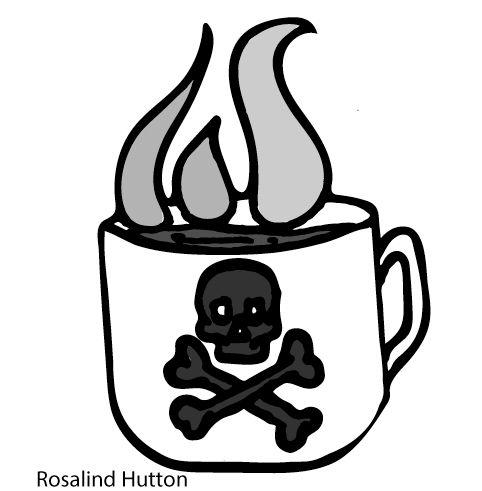How often do you consume an occasional cup of coffee, tea or soda? Many college students rely on caffeine, especially during testing periods.
Many are also unaware caffeine is the most widely used psychoactive drug in the world. If you feel you cannot face the morning without caffeine, be aware of the detrimental effects over the long term. Coffee drinkers who abstain from continued consumption wind up with irritability, lower information retention and sluggish behavior. Those symptoms of withdrawal could even contribute to lower test scores for the coffee-addicted student.
Naturally, everyone faces schedules on their own terms. Whether or not one decides to abuse caffeine, the impact can be seen on the roughest of mornings. As you drag yourself to class each day, pay attention to how wired some of your classmates are. Do you notice how a few twitch in their seats, vibrating silently along to the lecture? Perhaps you are one of the ones doing so, frantically trying to keep up with the hectic nature of a college lifestyle. The grip this drug holds, along with many other institutions and workplaces, controls a large percentage of individuals. While only a few negative connotations are associated, there is still some cause for concern.
Many still claim the benefits outweigh the costs. Several unfortunately notice how quitting is not easy, as addiction warped their brains into chemical dependence. Caffeineinformer, a comprehensive educational website, argues how over-indulgence can lead to permanently altered brain chemistry. Our brains cope with blocked sleep receptors by creating new ones, so when the caffeine flow stops, the results can be frightening. Dopamine is quickly replaced with lethargy, dwindling the productivity of schoolwork and studying habits. Those who choose to cram with coffee feel they need it to keep up with their hectic schedules.
Studies have been testing how caffeine affects humans since the late 19th century. Following this long-running trend, the 2008 study “Caffeine: Sleep and daytime sleepiness,” conducted by Timothy Roehrs and Thomas Roth, focused on sleep impact and daytime performance. Caffeine dependency was tested, along with levels of fatigue at higher doses. All caffeine levels reduced overall sleep time, leading to lower daytime alertness and performance. Personal intake determines long-term impact, but caffeine reliance is common with the high usage rates from workers. There is little incentive to cease consumption, given the easily abused dopamine rush.
Some avoid caffeine and turn to sugar for their daily energy boost. This is not a better alternative, as the human body can only efficiently process about 30 grams per day. Along with horrific crashes, there is legitimate fear of diabetes and body fat. Any sugar that is not led into the bloodstream is stored as fat. Ironically, there is not a fat industry, but there is certainly a sugar industry. Those who wish to care for their figure and overall health should look for the readily available nutrition facts. The first few listed ingredients are the most used, so be cautious of those which heavily include caffeine and sugars.
Everyone is entitled to ingest whatever they want, as long as its legal. Karima R. Sajadi-Ernazarova and Richard J. Hamilton of Drexel University conducted a study titled “Caffeine, Withdrawal” to determine further impact with this drug. Funnily enough, caffeine is not regulated in many parts of the world. In North America, reports suggest that 80 to 90 percent of all adults use caffeine regularly. A 400 mg per daily intake cannot be effectively processed by the human body. This can be easily surpassed by drinking over four cups of coffee or two energy drinks. To claim this substance is not a drug requires denying over a century of empirical evidence, research and studies.
Inevitably, many will continue to drink coffee, tea and other caffeinated beverages. Regardless of the health risks, there is a strong desire for an immediate performance boost.
Please keep in mind this energy is borrowed from the future, not created. If you wish to abstain, try weening your intake by dwindling down to lower doses. An excellent solution is tea, which has less caffeine per serving. Decaf options of your favorite beverages are also readily available. Many of us need not rely so heavily on this drug, so you might want to look into decreasing your caffeine dependency—after finals, of course.
You might want to rethink your coffee consumption after finals week

You might want to rethink your coffee consumption after finals week
About the Contributor

Brandon Grisham, Former Online Editor
Brandon Grisham served as the Online Editor from 2019 to 2020.
He also started The Reflector's digital archive, dubbed the "Grisham Archive Project."

























































































